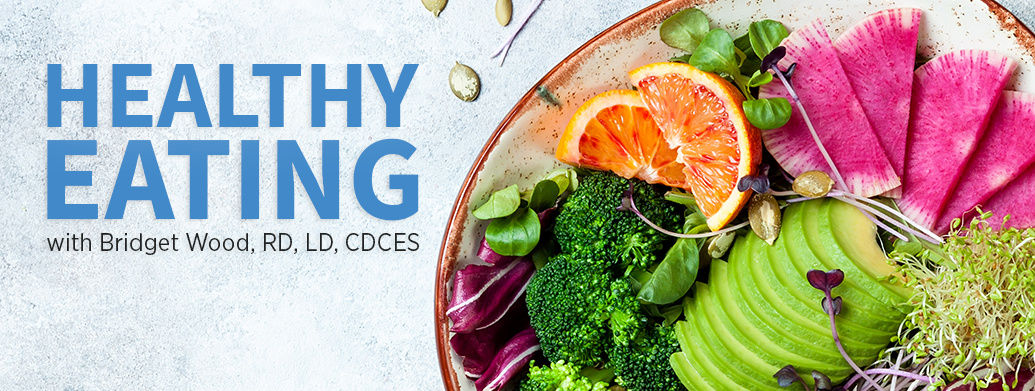
 October is one of my favorite months for many reasons—the leaves changing, the fall themed treats and eats, the cooler weather and spooky activities. It also happens to be Vegetarian Awareness Month!
October is one of my favorite months for many reasons—the leaves changing, the fall themed treats and eats, the cooler weather and spooky activities. It also happens to be Vegetarian Awareness Month!
While I am not someone who practices vegetarian or veganism, I have an appreciation for vegetarian and vegan dishes, and include them in my diet regularly. These meals are not only delicious, but can also be super nutritious as you can get the benefits that come from consuming veggies.
Before we jump into how eating more plants can positively impact your diabetes care, I want to go over the definitions of vegan, vegetarian and plant-based eating.
Veganism is accepted to mean that a person does not eat any form of animal product (no dairy, eggs, meat, etc.) and only consumes plants (fruits and vegetables, but also nuts, seeds, oils, whole grains, legumes and beans).
Vegetarians are people who will not eat meat, but may eat other animal products like dairy or eggs.
 Plant-based, a more recent term, can mean something different depending on who you ask (some use it interchangeably with veganism). The nutrition field recognizes plant-based eating as putting a focus on consuming plants. This could mean that a person who eats plant-based consumes meat or animal products from time to time.
Plant-based, a more recent term, can mean something different depending on who you ask (some use it interchangeably with veganism). The nutrition field recognizes plant-based eating as putting a focus on consuming plants. This could mean that a person who eats plant-based consumes meat or animal products from time to time.
If you’re looking to get the benefits that come from vegetarian and vegan diets, but not ready to make a significant lifestyle change, you can just simply…eat more plants!
Studies have shown that a diet that includes plant-based whole foods (a variety of vegetables, whole grains, nuts and legumes) can be one of the methods used to help physicians, registered dietitians and patients address the chronic lifestyle diseases that are so prevalent today.
A plant-based diet is not only considered to be packed with nutrients such as fiber, healthy fats, protein, vitamins and minerals, but it also can be a great lifestyle for those living with diabetes due to its health benefits.
Improved Kidney Function
Despite common misconceptions, a plant-based diet can be beneficial to most people living with diabetes, including those with kidney disease (Be sure to always discuss with your own registered dietitian and physician team to determine the best lifestyle for you).
Recent studies of patients who receive dialysis showed that those who followed a plant-based diet had less protein in their urine, lower inflammation and blood pressure, decreased risk for heart disease and were able to use their insulin better. There is also another study that found individuals who have Chronic Kidney Disease (CKD), a condition in which the kidneys are unable to filter properly, had a 23% lower mortality risk for every 33% increase in plant to total protein consumption.
Additionally, plant-based diets can help patients with CKD who are of higher weight and suffer from other conditions, like high blood pressure, relieve some of the extra stress on their kidneys. For people living with diabetes, a lowered risk for heart disease, high blood pressure and stroke can often help with delaying complications such as CKD or even preventing them (when paired with optimal time in range).
Improved Cholesterol and Heart Health
In previous blog posts, I’ve discussed fats and their impacts on health, in particular heart health.
While animal products are known to have higher amounts of saturated fats, trans fats and cholesterol (Remember to think of consuming less of these types of fats!), plants are naturally very low in these items and can actually improve cholesterol and lower risks of heart disease.
Plants are high in soluble fiber, the type that helps to lower cholesterol by slowing the absorption of the cholesterol consumed and reducing the amount of cholesterol the liver produces. With that being said, it is important to be mindful of the entire picture when it comes to food. The other “accessory” items in your meals could impact these health benefits if consumed in excess (i.e., using three sticks of butter to sauté a crown of broccoli).
Improved Insulin Sensitivity
 While insulin resistance means that your body is unable to use insulin properly or as well as it should, insulin sensitivity is basically the reverse of this. When your insulin sensitivity is improved, it can lead to a reduction in the amount of insulin needed to manage your numbers and can improve the way that your body uses insulin (whether you are injecting insulin, using a pump, or producing insulin on your own).
While insulin resistance means that your body is unable to use insulin properly or as well as it should, insulin sensitivity is basically the reverse of this. When your insulin sensitivity is improved, it can lead to a reduction in the amount of insulin needed to manage your numbers and can improve the way that your body uses insulin (whether you are injecting insulin, using a pump, or producing insulin on your own).
You will probably grow extremely tired of me mentioning fiber, but I cannot stress how much of a difference having the appropriate amount of fiber in your diet can improve your health overall. By eating more plants, you are providing your gut microbiome with the fuel it needs to perform optimally and ensure a balanced “gut.” The gut microbiome has been studied and has been said to reduce risks of certain diseases and have an impact on their management.
Studies have also shown that eating more plants can be anti-inflammatory and in some cases impact the insulin resistance this way. Saturated fats can impact insulin signaling in muscles due to the accumulation of certain free fatty acids, which can increase insulin resistance. By consuming more plants in your diet, you are reducing the intake of saturated fats, which are found mostly in animal products, and increasing the intake of monounsaturated fats and polyunsaturated fats. The research shows that when replacing saturated fats with unsaturated fats (mono and poly), you can reduce your inflammation and increase your insulin sensitivity.
Now that we have dived deeper into just SOME of the fantastic things plant-based eating can do for you, I do want to also give you fair warning!
People initially tend to think that they have to go out and purchase all of the latest and greatest plant-based pre-packaged foods and that is not the case. In fact, certain foods that are marketed in this way can be just as high in saturated fat, sodium and calories as the animal-product version. It doesn’t have to be complicated. Something as simple as aiming for at least ⅔ of your plate as veggies can help to provide you the same benefits. Plant-based eating isn’t another diet, it is a lifestyle change. I realize we all have heard that phrase a million times, but this time it seems to be most true. There are no restrictions, just an emphasis on making the plants the star of the show!
 One easy way to begin your journey to plant-based eating is by adding more plants at meal times (or potentially snack time!). The recipe below for Air Fryer Blistered Shishito Peppers helps you to reach that goal, with minimal prep and virtually no cook time at all. I experiment with different toppings each time I make this and it never disappoints. It can be made in the air fryer, skillet, or cast iron.
One easy way to begin your journey to plant-based eating is by adding more plants at meal times (or potentially snack time!). The recipe below for Air Fryer Blistered Shishito Peppers helps you to reach that goal, with minimal prep and virtually no cook time at all. I experiment with different toppings each time I make this and it never disappoints. It can be made in the air fryer, skillet, or cast iron.
Air Fryer Blistered Shishito Peppers Recipe (PDF)
Starting on a new eating journey can be overwhelming, but just start off by simple changes like increasing veggie intake by ¼ cup every couple of weeks. As you begin to eat more of these plant-based foods, be sure to use the Glooko mobile app’s food tracker feature to log your intake. You’ll be a plant-based eating pro in no time!
Don’t forget to tag @Glooko or myself (@BalancedWithBridgetWood) on Instagram, and use the hashtags, #BetterTogether and #BalancedWithBridgetWood, in all of your creations!
Your Friend in Food,
Bridget Wood, RD, LD, CDCES
MKT-0405
